Epival Syrup Uses, Side Effects
Epival Syrup (also known as Epival Oral Solution) is a brand name for divalproex sodium or sodium valproate, an anticonvulsant medication.
It works by increasing levels of gamma-aminobutyric acid (GABA) in the brain, which helps stabilize nerve activity and prevent abnormal electrical signals.
It is available in liquid form for easier administration, especially for children or those who have difficulty swallowing tablets. Always consult a healthcare professional before starting or stopping this medication, as it requires a prescription and monitoring.
Epival Syrup Uses
Epival Syrup is primarily prescribed for the following conditions:
- Epilepsy and Seizures: Controls various types, including absence seizures, partial seizures, and generalized tonic-clonic seizures. It can be used alone or with other anticonvulsants.
- Bipolar Disorder (Mania): Helps manage manic episodes by stabilizing mood.
- Migraine Prevention: Reduces the frequency and severity of migraine headaches.
- Other Uses: Sometimes prescribed off-label for trigeminal neuralgia or certain mood disorders.
Dosage varies by age, weight, and condition (e.g., 15–60 mg/kg/day for epilepsy in children, divided into 2–3 doses). It is typically taken with food to reduce stomach upset, and the bottle should be shaken well before use.
Epival Syrup Side Effects
Most side effects are mild and may improve as your body adjusts, but some can be serious. Common side effects include:
| Category | Common Side Effects | Less Common/Rare Side Effects |
|---|---|---|
| Neurological | Dizziness, drowsiness, headache, tremor, blurred/double vision, weakness, impaired coordination | Insomnia, confusion, aggression, suicidal thoughts (seek immediate help if mood changes occur) |
| Gastrointestinal | Nausea, vomiting, diarrhea, stomach pain, constipation, dry mouth, loss of appetite | Pancreatitis (severe abdominal pain) |
| Metabolic/Other | Weight gain, increased appetite, hair loss (or increased facial/body hair), acne | Liver issues (yellowing of skin/eyes), low platelet count, irregular heartbeat, allergic reactions (rash, swelling) |
- Overdose Symptoms: Extreme drowsiness, coma, irregular heart rate—seek emergency medical help.
- Long-Term Risks: Potential for liver damage, bone marrow suppression, or hormonal changes. Regular blood tests are recommended.
Precautions and Warnings
Epival Syrup, used primarily for epilepsy, bipolar disorder, and migraine prevention, requires careful use under medical supervision due to potential risks. Below are key precautions and warnings to consider:
- Pregnancy and Breastfeeding:
- Pregnancy: High risk of birth defects (e.g., neural tube defects like spina bifida) and developmental issues in the fetus. Not recommended during pregnancy unless no safer alternative exists. Women of childbearing age must use effective contraception and discuss risks with their doctor.
- Breastfeeding: Small amounts pass into breast milk, which may pose a mild risk to the infant. Consult your doctor to weigh benefits versus risks.
- Liver Function:
- Can cause severe liver damage, especially in children under 2 years, those with mitochondrial disorders, or those on multiple anticonvulsants. Symptoms include yellowing of skin/eyes (jaundice), fatigue, or dark urine.
- Regular blood tests are required to monitor liver function, especially in the first 6 months.
- Pancreatitis:
- Rare but life-threatening inflammation of the pancreas can occur. Seek immediate medical help for severe abdominal pain, nausea, or vomiting.
- Blood Disorders:
- May cause low platelet count (thrombocytopenia), increasing bleeding risk, or reduced white/red blood cells. Watch for unusual bruising, bleeding, or infections. Periodic blood tests are advised.
- Suicidal Thoughts:
- Anticonvulsants like Epival may increase the risk of suicidal thoughts or behavior. Monitor for mood changes, depression, or agitation, and seek immediate help if these occur.
- Alcohol and CNS Depressants:
- Avoid alcohol and medications like sedatives or opioids, as they enhance drowsiness and dizziness, increasing the risk of accidents.
- Driving and Operating Machinery:
- May cause dizziness, drowsiness, or impaired coordination. Avoid driving or hazardous activities until you know how the medication affects you.
- Drug Interactions:
- Interacts with medications like aspirin (increases bleeding risk), warfarin, lamotrigine (increases lamotrigine levels), or other anticonvulsants. Inform your doctor of all medications, including over-the-counter drugs and supplements.
- Children and Elderly:
- Children: Higher risk of liver toxicity, especially in those under 2 or with metabolic disorders. Behavioral changes (e.g., aggression) should be monitored.
- Elderly: May require lower doses due to slower metabolism and increased sensitivity to side effects.
- Discontinuation:
- Do not stop abruptly, as this can worsen seizures or trigger a manic episode. Taper off gradually under medical guidance.
- Allergic Reactions:
- Rare but serious reactions like rash, swelling, or difficulty breathing require immediate medical attention.
- Other Conditions:
- Use cautiously in patients with kidney issues, bleeding disorders, or a history of depression. Inform your doctor of all medical conditions.
- Monitoring:
- Regular blood tests are needed to check liver function, platelet count, and drug levels. Therapeutic levels typically range from 50–100 mcg/mL for epilepsy, but this varies by condition.
Note: This information is for educational purposes only. Always consult a healthcare professional for personalized advice, especially before starting, adjusting, or stopping Epival Syrup. If severe symptoms (e.g., rash, jaundice, severe abdominal pain) occur, seek emergency care immediately.
Disclaimer
The information provided on quickdawa.com regarding medicine prices and side effects is solely based on data collected from public domains. I am not a doctor or medical professional. While I strive to provide accurate and up-to-date information, I cannot guarantee the absolute accuracy or completeness of the data. It is always recommended to consult with a qualified healthcare professional or doctor for personalized medical advice and information. The content on this blog should not be considered a substitute for professional medical guidance. The readers are advised to use the information provided at their own discretion and risk. I do not assume any responsibility for any consequences arising from the use of the information on this blog.
Thank you.







